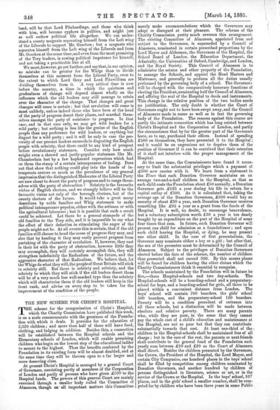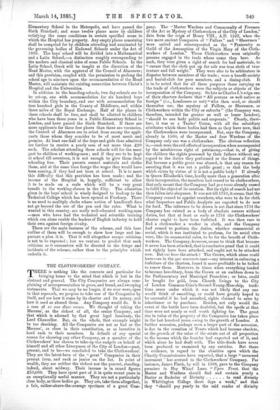THE NEW SCHEME FOR CHRIST'S HOSPITAL.
THE scheme for the reorganisation of Christ's Hospital, which the Charity Commission have published this week, is on a scale commensurate with the greatness of the Foundation with which it deals. It provides for the education of 2,320 children ; and more than half of these will have food, clothing, and lodging in addition. Besides this, a connection will be established between the Hospital schools and the Elementary schools of London, which will enable promising children who begin on the lowest step of the educational ladder to mount to the highest. Thus the benefits conferred by the Foundation in its existing form will be almost doubled, and at the same time they will be thrown open to a far larger and more deserving class.
At present Christ's Hospital is managed by a general Court of Governors, consisting partly of members of the Corporation of London and partly of persons who have given £500 to the Hospital funds. The powers of this general Court are mainly exercised through a smaller body called the Committee of Almoners, though on all important matters this Committee merely make recommendations which the Governors may adopt or disregard at their pleasure. The scheme of the Charity Commission pretty much reverses this arrangement. The existing Committee of Almoners, appointed from and subject to the Governors, is superseded by a Council of Almoners, nominated in certain prescribed proportions by the Lord Mayor and Aldermen, the Governors of the Hospital, the School Board of London, the Education Department, the Admiralty, the Universities of Oxford, Cambridge, and London, and the Royal Society. This Council of Almoners is to administer the estates and other property of the Foundation, to manage the Schools, and appoint the Head Masters and Mistresses, and generally to perform all the duties usually performed by the governing body of a school. The Governors will be charged with the comparatively honorary functions of electing the President,nominating half the Council of Almoners, and affixing the seal of the Hospital to deeds and instruments. This change in the relative position of the two bodies needs no justification. The only doubt is whether the Court of Governors ought not to have been swept away, and the Council of Almoners made in name as well as in fact the governing body of the Foundation. The reasons against this course are partly the intimate connection which has long existed between Christ's Hospital and the Corporation of London, and partly the circumstance that by far the greater part of the Governors have, so to say, purchased their offices. Instead of spending £500 on themselves, they have presented it to the Hospital ; and it would be an ungracious act to deprive them of the position of Governor if it can be contrived that their retention of it shall not interfere with the proper management of the Hospital.
At the same time, the Commissioners have found it necessary to limit the substantial privileges which a payment of £500 now carries with it. We learn from a statement in the Times that each Donation Governor maintains on an
average two-and-a-half children in the Hospital, so that as each child costs the Foundation about £50 annually, a Donation Governor gets £125 a year during his life in return for a capital outlay of £500. As it is calculated that, taking the average age of the Donation Governors, £500 would buy an annuity of about £30 a year, each Donation Governor receives something like £95 a year as a grant from the funds of the Hospital. It is well, no doubt, to encourage benevolence, but a voluntary subscription worth £30 a year is too dearly bought by an expenditure on the part of the Hospital of some four times that sum. In future, each Donation Governor will present one child for admission as a fouudationer ; and upon such child leaving the Hospital, or dying, he may present one other child. In the case of first presentations, the Governor may nominate either a boy or a girl ; but after that, the sex of the presentee must be determined by the Council of Almoners. Subject to the privileges of Donation Governors elected before the date of the scheme, the number of children thus presented shall not exceed 300. By this means places will be found for children having the other claims which the Charity Commissioners think it essential to recognise.
The schools maintained by the Foundation will in future be five,—three Hospital-schools and two day-schools. The Hospital-schools will be a boarding-school and a preparatoryschool for boys, and a boarding-school for girls, all three to be placed within a convenient distance from London. The boys' school will contain 700 boarders, the girls' school 500 boarders, and the preparatory-school 120 boarders. Poverty will be a condition precedent of entrance into all these schools, but a distinction will be made between absolute and relative poverty. There are many parents who, while they are poor, in the sense that they cannot pay the whole cost of a child's education and maintenance at the Hospital, are not so poor but that they can contribute substantially towards that cost. At least one-third of the . children in the Hospital-schools shall be maintained free of all charge ; but in the case of the rest, the parents or next friends shall contribute to the general fund of the Foundation such yearly sum between £10 and £20 as the Court of Almoners shall direct. Besides the children presented by the Governors, the Crown, the President of the Hospital, the Lord Mayor, and certain City Companies, one hundred places in the boys' school shall be filled by competition among children nominated by Donation Governors, and another hundred by children of persons distinguished in literature, science or art, or in the service of the Crown or the Hospital. In the boys' school, 107 places, and in the girls' school a smaller number; shall be competed for by children who have been three years in some Public
Elementary School in the Metropolis, and have passed the Sixth Standard; and some twelve places more by children satisfying the same conditions in certain specified areas in which the Hospital has property. Any empty places remaining shall be competed for by children attending and nominated by the governing bodies of Endowed Schools under the Act of 1869. The boys' school will be divided into a Mathematical and a Latin School,—a distinction roughly corresponding to the modern and classical sides of some Public Schools. In the Latin School, Greek will be taught at the discretion of the Head Master, with the approval of the Council of Almoners ; and this provision, coupled with the permission to prolong the school age to nineteen upon the recommendation of the Head Master, will maintain the existing connection between Christ's Hospital and the Universities.
In addition to the boarding-schools, two day-schools are to be set-up, one with accommodation for six hundred boys within the City boundary, and one with accommodation for four hundred girls in the County of Middlesex, and within three miles of the Royal Exchange. Half of the places in these schools shall be free, and shall be allotted to children who have been three years in a Public Elementary School in London, and have passed the Sixth Standard. If there are more applicants for these free places than there are vacancies, the Council of Almoners are to select from among the applicants those whom they consider to be of most merit and promise. At least one-half of the boys and girls thus admitted are further to receive a yearly sum of not more than £20 each. The scholars attending these schools will for the most part be children of working-men ; and if they are to be kept at school till seventeen, it is not enough to give them their schooling free. Their parents cannot maintain and clothe them, and at the same time forego the wages they would have been earning, if they had not been at school. It is to meet this difficulty that this provision has been made ; and the income of the Hospital is, happily, sufficient to allow it to be made on a scale which will be a very great benefit to the working-classes in the City. The education given in the boys' school is wisely designed to lead-up to the Technical College which has been opened at Finsbury. There is no need to multiply clerks whose notion of handicraft does not go beyond the use of the pen and the ruler. What is wanted in this country, are really well-educated working-men —men who have had the technical and scientific training which can alone enable the leaders of English industry to bold their own against foreign rivalry.
These are the main features of the scheme, and this bare outline of them will be enough to show how large and important a plan it is. That it will altogether escape criticism is not to be expected ; but we venture to predict that such criticism as it encounters will be directed to the fringe and incidents of the scheme, rather than to the principles which underlie it.



































 Previous page
Previous page